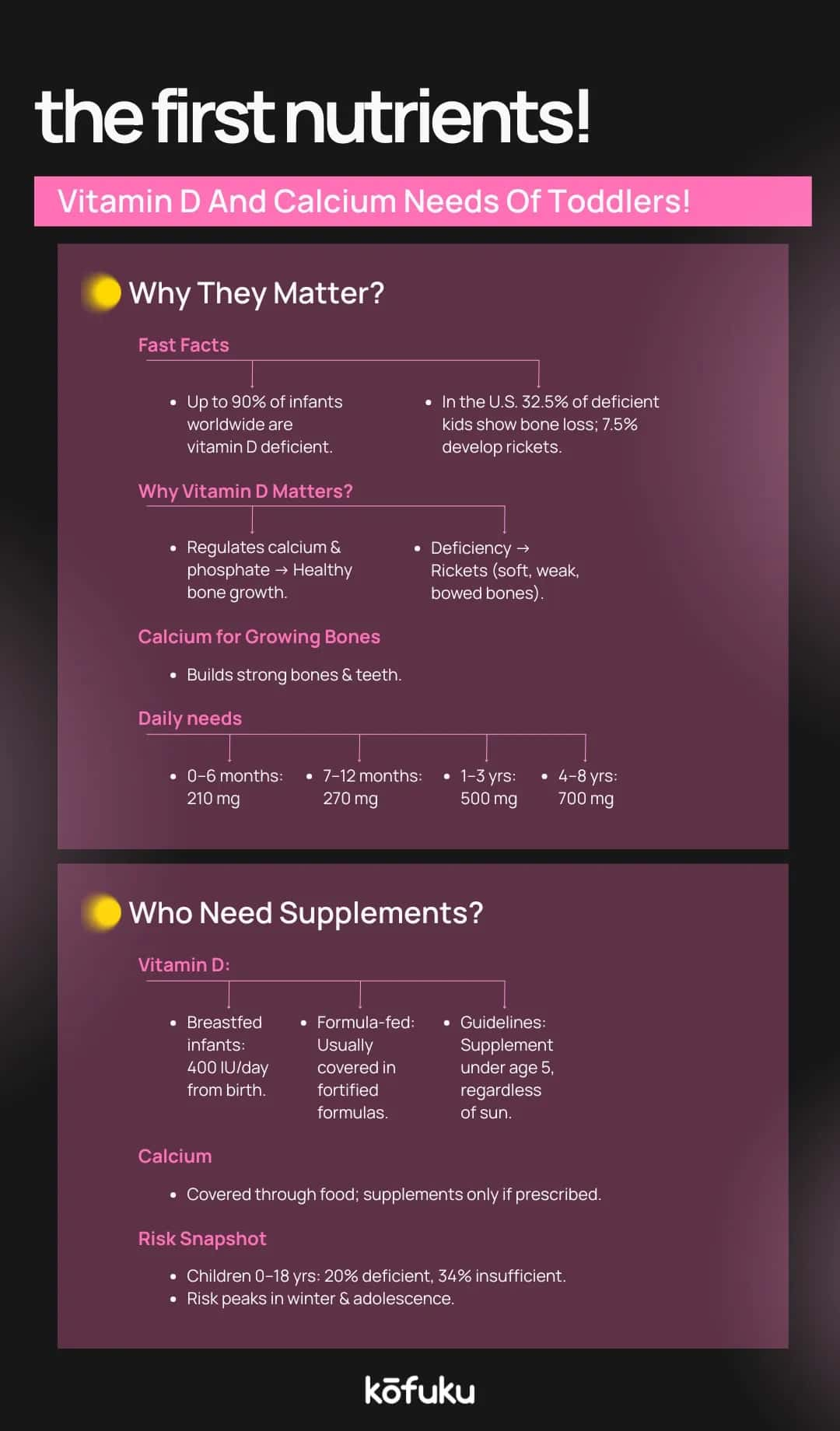Home
Blogs
Parenting
Infant and Toddler Health: Why Supplements Like Vitamin D and Calcium Are Important
Infant and Toddler Health: Why Supplements Like Vitamin D and Calcium Are Important


Introduction
In India, new parents are often bombarded with recommendations for various bottles, drops, and powder products for their babies. Among them, vitamin D in infants and calcium supplements in newborns are the most frequently questioned: When should they be given? How do they affect growth?
Good supplementation is not merely a matter of trend-following; it has a significant role to play in aiding the development of bones, immunity, and the general well-being in infants. This blog discusses the importance of these supplements, safe use, and how they add to diet and sunlight in contributing to the maximum wellness of infants and toddlers.
Why Vitamin D Drops Are Essential for Infants
Calcium is dependent on vitamin D to be absorbed and is an ideal mineral for bone. Newborns, particularly those who are exclusively breastfed, tend to lack adequate vitamin D content in the breast milk. This inadequacy may result in rickets, slow growth, and a weak immune system.
The preferred supplementation method of newborns is the use of vitamin D drops. They provide an accurate and convenient dose, ensuring a safe and effective intake of vitamin D to prevent deficiency.
Vitamin D3 Drops for Newborn: When and How to Give
The recommended intake of vitamin D3 drops in newborns is initiated as soon as possible during the first few days of life. A regular dose of values between 400 and 600 IU per day, as advised by paediatricians. Drops may be put into the mouth of the infant or mixed with breast milk.
Regularity is crucial: Administering the drops at the same time every day helps get into a routine and keep vitamin D levels stable.
Can Vitamin D Be Taken at Night for Infants?
Yes, vitamin D drops for infants can be given at night. Parents have the opportunity to select morning or bedtime dosing depending on the feeding schedule to allow habits to be in line with each other daily.
Vitamin D Bottle: How to Store and Use Safely
Vitamin D bottles should be stored in a cool, dry place and away from direct sunlight. Ensure you look at the expiry date and take the appropriate dose. Correct use of the dosage provided will eliminate the problem of under- or overdosing.

Multivitamin Infant Drops: Are They Necessary?
Multivitamin infant drops might not be a necessity for infants who take a well-balanced diet. Nonetheless, they are useful when a baby has selective feeding, low birth weight, or is sick. Multivitamins contain a combination of nutrients such as vitamin D, vitamin A, and iro,n and help enhance overall growth and immunity.
Multivitamin vs Single Nutrient Supplements
Multi-nutrient drops, such as these multi-vitamin drops or this multivitamin newborn, are designed to address a range of nutritional deficiencies. The formulas of multivitamin infant formulations are more broadly nutritious. The paediatricians typically evaluate the dietary intake and prescribe the use of a single-N compared to a multivitamin in succession.
Calcium Supplements for Infants: Do Babies Really Need Them?
Although calcium is an essential component of the mixture of healthy bones and teeth, most full-term infants who are healthy do not require supplementation outside of what is naturally occurring in the breast milk or the formula. Supplements are needed mainly when the diet is inadequate, in prematurity, or with metabolic defects in calcium absorption.
Newborn Calcium Supplement: When It’s Prescribed
Fresh calcium supplement can be prescribed to predisposed hypocalcaemic neonates or those on drugs that interfere with the bone mineralisation process. The paediatricians can prescribe supplements such as calcium supplements in babies or calcium gluconate drops in specific doses during the physiological development of the bones.
Calcium Gluconate and Infant Nutrition
Calcium gluconate is a calcium supplement for infants used for regular consumption under medical care. It is water-insoluble and inappropriate for oral consumption in fresh births. It must be given under controlled dosage to prevent excessive intake of calcium, which may lead to constipation or renal issues.

Constipation Drops for Infants: Safe Options and Guidance
Formula, solids, or even supplements in the form of calcium supplements might cause some digestive discomfort or result in constipation in some newborn babies as they [infants] change to the new baby formula. Laxatives, such as constipation drops, are usually prescribed to help infants facilitate bowel movements.
Parents are advised to consult a paediatrician before use, ensure formulations picked are of the appropriate age, and remember to provide hydration to foster digestive health.
Balancing Diet, Sunlight, and Supplementation for Babies
Optimal infant health relies on a combination of diet, sunlight, and supplementation:
- Sunlight: Brief, supervised exposure helps the skin synthesise vitamin D naturally.
- Diet: Breast milk or formula generally provides essential nutrients, but some infants may require multivitamin infant drops or D3 drops for infants for additional support.
- Supplements: Targeted supplementation, like vitamin D3 drops for newborns or a newborn calcium supplement, ensures nutrient gaps are addressed safely

FAQs
Q. Why do infants need vitamin D drops?
A. Vitamin D for infant, drops or other forms, support bone growth, calcium absorption, and immune function. This is sometimes crucial because breast milk alone can lack sufficient vitamin D, making supplementation essential for healthy development.
Q. When should I start giving vitamin D drops to newborns?
A. Vitamin D drops for newborns are typically started within the first few days of life. Paediatricians recommend daily supplementation to prevent rickets and support proper skeletal development in infants.
Q. What is the correct dosage of vitamin D3 drops for infants?
A. The standard dose of vitamin D3 for newborns is 400–600 IU per day. Use the provided dropper for accuracy, and follow paediatric guidance to ensure safe supplementation.
Q. Can vitamin D drops be given at night to babies?
A. Yes, vitamin Ddrops for infants can be given at any time, including at night. Consistency matters more than timing, so choose a schedule that aligns with feeding routines.
Q. What is the difference between vitamin D newborn drops and multivitamin infant drops?
A. Vitamin D newborn drops provide only vitamin D, targeting bone and immune health. Multivitamin infant drops contain multiple nutrients, including vitamin D, iron, and vitamins A and C, for broader nutritional support.
Q. Are multivitamin drops safe for newborns?
A. Multivitamin infant drops are generally safe when used as prescribed. Overuse can cause side effects, so follow paediatrician recommendations and ensure the formulation is appropriate for the baby’s age.
Q. Do infants really need multivitamin supplements?
A. Healthy, full-term infants with balanced breast milk or formula often do not require multivitamins. Supplements are recommended primarily for premature babies, selective eaters, or those with specific nutritional deficiencies.
Q. Which calcium supplement is best for infants?
A. A newborn calcium supplement, like calcium gluconate or an infant calcium supplement drop, is preferred under medical guidance. Paediatricians recommend dosage based on age, diet, and individual health needs.

Children’s Health Tips for Daycare Safety & Wellness

How Illness Affects Children's Emotions: A Parental Guide

Normal Newborn Temperature: Why Accurate Measurement Matters for Infant Health

Diaper Rash in Newborns and Infants: Causes and Symptoms Explained

A Guide for First-Time Parents in 2025 – Best Advice

